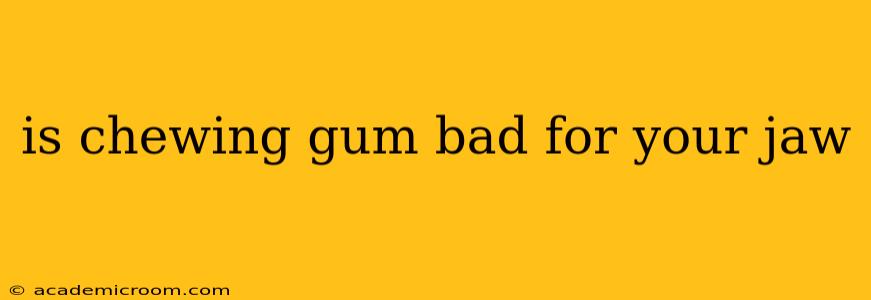Chewing gum is a popular pastime enjoyed by millions worldwide, offering a refreshing sensation and a potential aid for focus or stress relief. However, concerns persist about its potential impact on jaw health. While moderate chewing is unlikely to cause significant harm for most people, excessive or improper chewing habits can indeed contribute to jaw problems. This article delves into the potential negative effects of chewing gum on your jaw, explores common concerns, and offers advice on safe and responsible chewing habits.
Can Chewing Gum Cause TMJ?
This is a frequently asked question, and the answer is nuanced. Temporomandibular joint (TMJ) disorders encompass a range of conditions affecting the jaw joint. While chewing gum itself isn't directly causing TMJ, it can exacerbate existing conditions or contribute to their development in susceptible individuals. Excessive chewing, clenching, or grinding your teeth while chewing gum can put undue stress on the jaw joint, leading to pain, clicking, and limited jaw movement, characteristic of TMJ. For individuals already experiencing TMJ symptoms, chewing gum should be approached with caution or avoided altogether.
Does Chewing Gum Strain Your Jaw Muscles?
Yes, excessive chewing gum can strain your jaw muscles. Just like any repetitive action, constantly chewing can lead to muscle fatigue, soreness, and even pain. The masseter muscles (located in the cheeks) and the temporalis muscles (located at the temples) are primarily responsible for chewing. Overworking these muscles through prolonged or forceful gum chewing can result in muscle strain, headaches, and discomfort in the jaw area.
How Much Chewing Gum Is Too Much?
There's no magic number, as individual tolerances vary. However, listening to your body is crucial. If you experience jaw pain, headaches, or discomfort after chewing gum, you're likely chewing too much. Moderation is key. Limit your chewing sessions and avoid forceful chewing. Taking breaks between chewing sessions allows your jaw muscles to relax and recover.
Can Chewing Gum Cause Jaw Pain?
Yes, excessive or forceful gum chewing can absolutely cause jaw pain. As mentioned before, overusing your jaw muscles can lead to strain, inflammation, and pain. This pain can range from mild soreness to severe, throbbing discomfort. If you experience persistent jaw pain, it’s essential to consult a dentist or a doctor to rule out other potential causes and receive appropriate treatment.
What are the Long-Term Effects of Chewing Gum on Your Jaw?
Long-term, excessive gum chewing can lead to several problems including:
- Chronic Jaw Pain: Persistent strain on the jaw muscles can result in chronic pain and discomfort.
- TMJ Disorders: As previously discussed, excessive gum chewing can contribute to or worsen existing TMJ disorders.
- Dental Problems: While less directly related to the jaw itself, forceful chewing can damage teeth or existing dental work.
How to Chew Gum Safely
To minimize the risk of jaw problems, follow these guidelines:
- Chew moderately: Avoid excessive chewing. Limit your chewing sessions and take frequent breaks.
- Chew gently: Avoid forceful or aggressive chewing.
- Choose sugar-free gum: Sugar-free gum minimizes the risk of cavities.
- Listen to your body: Stop chewing if you experience any discomfort.
- Consult a professional: If you experience persistent jaw pain, seek professional medical advice.
In conclusion: While chewing gum isn't inherently harmful, excessive or improper chewing habits can indeed contribute to jaw problems. Moderation, gentle chewing, and listening to your body are crucial for minimizing risks. If you experience persistent jaw pain or discomfort, consult a dentist or doctor for proper diagnosis and treatment.
